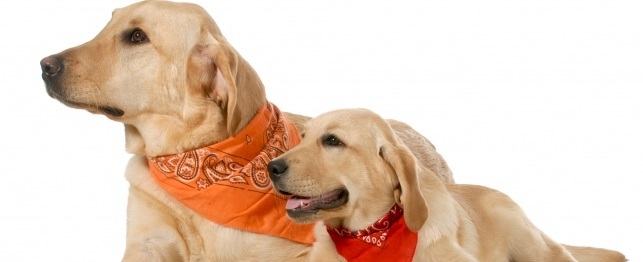

Dogs
Buying a dog is no small decision. Often, it's a choice made impulsively (Oh, look! Puppies!), and later regretted. To fully prepare yourself for the challenges-and the many rewards-of buying a dog, research the subject carefully. Talk to other dog owners, dog breeders, your veterinarian, and animal shelter professionals and volunteers before buying a dog-or adopting one. What you learn will help to ensure that you are buying the right dog for you, for your family, and for your living situation.
Dogs take commitment of both money and time. It is essential that you consider this up front before getting a dog. Buying a dog is a luxury, in some ways, no different than any other leisure product or craft. Just as owning a "boat" can be fun, it requires ongoing care, dock fees, maintenance and your time. So does your new dog.
Dogs take time. They need for you to take them for a walk, for you to feed, exercise and play with them and they need to be let out to do their business. Depending on the breed of your future dog, some need to be groomed on a regular basis and grooming can be very costly and or time consuming. Before buying a dog that requires regular grooming call your local vet, buy a breed specific, call a breed club, talk to people who have the breed of dog you are interested in buying for what type and the cost grooming. Consider how you spend your time and when you would have time to spend with your new four-legged friend. You should consider having at least 2 hours per day in your time budget to give your dog the love he or she deserves.
Are you buying a dog for the city, or the country?? Are you buying a dog that will live in the house, or in a warm, secure kennel? Will it have a fenced in yard or a local park in which to play? Do you live near the water? Ocean? Lake? River? Stream? Canal? Pond? Swimming pool? If yes, having a dog that is water friendly and who is a strong swimmer is a must. Please not that an accidental drowning not only happen to people but also to dogs; some dogs are not strong or the best of swimmers and can easily drown.
Are you buying a dog that's friendly, or might it bite? Think about your lifestyle: do you have kids, other pets, do you have friends and family over your house frequently? If yes, then an aggressive dog is not a good match.
We have all heard the phase: Location, Location, Location... and now you are saying to yourself, what does "location" and my future dog have to do with one another? EVERYTHING. Now this might seem like a no-brainer, but certain breeds of dogs do not do well in certain environments. For example having an Alaskan Husky in hot and humid South Florida or the hot and dry dessert would not be a good match for this thick furred, cold-weather-loving pooch. And having a Chihuahua in Alaska during the cold, long winter months may not be fair or healthy to this fragile, light-coated breed. These and other concerns and questions are important to answer before buying a dog. In fact, there are almost as many questions as there are dogs. But if you're serious about buying a dog, you can improve your chances of success by being thoughtful, deliberate, and cautious.
Are you buying a dog for pleasure, companionship or for protection? Consider what you want your dog for, example do you want just a pet, a show dog, or a sporting, non-sporting, hounds, working dogs, herding dogs, terriers, toys, rescue, or a service and guide dogs? This will influence your selection for finding your perfect pooch.
Do You Have Enough Room for the Dog You Want? Consider your environment relative to the size of dog and the exercise requirements of that particular dog. Do you have an apartment, home with yard or a farm? This may impact the size or breed you select. The larger the breed or size of dog, generally the more room you need. A small apartment may work well for small dogs that are less active. However, it is possible to have a larger breed dog in a small space, but you need to make sure you give him enough external stimulation to make sure he gets what he needs in terms of play and exercise. Also consider if you have weight restrictions on how big a dog you can own if you are in a rental or condo unit.
If you choose a purebred dog, research it well. Read information on our site by searching on that breed, ask your vet, talk to friends who have the breed of dog you are interested in, or go to your local library. Know what you are getting. Too many pets end up in shelters because dog buyers didn't know what they were getting.
There are pros and cons to both. It is essential to understand the positive and negative aspects of both so you can make the right decision for your situation. Purebred dogs generally have a history that can often help you understand their personalities, appearance, size and weight average, exercise requirements, health problems, life expectancy, and even idiosyncrasies. You often know what you will get. However, purebreds are often considered less hardy than mixed breeds, as a result of inbreeding. Mixed breeds are also going to be less expensive but often you don't know for sure what you are getting. Many times it is difficult to know what breeds even make up the mix so it is almost impossible to predict the personality traits of a particular dog. So, some important things to think about include: Why do you want your dog (for example, do you want a companion or a guard dog?) Do you want a dog to look a particular way (such as with a purebred?)? Can you handle some unpredictability in what you are getting (such as in a mixed breed?) How much time and money do you want to spend? Do you have kids? Other pets? Answer these questions honestly and this will guide you to finding your perfect dog.
 Your Guide to Dog Adoption
Your Guide to Dog Adoption
Your Guide to Dog Adoption
Your Guide to Dog Adoption
 Top Dog Breeds for Life Outdoors
Top Dog Breeds for Life Outdoors
Top Dog Breeds for Life Outdoors
Top Dog Breeds for Life Outdoors
 Dog Breeds Good for Apartment Living
Dog Breeds Good for Apartment Living
Dog Breeds Good for Apartment Living
Dog Breeds Good for Apartment Living
 10 Most Popular Large Breed Dogs
10 Most Popular Large Breed Dogs
10 Most Popular Large Breed Dogs
10 Most Popular Large Breed Dogs
 Puppy or Adult: Which is Right for You?
Puppy or Adult: Which is Right for You?
Puppy or Adult: Which is Right for You?
Puppy or Adult: Which is Right for You?
Copyright © 2005-2016 Pet Information All Rights Reserved
Contact us: www162date@outlook.com